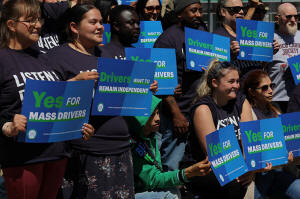|
Massachusetts Attorney General Andrea Joy Campbell is asking a
judge to conclude that drivers for Uber and Lyft are employees
under state law and therefore entitled to benefits such as a
minimum wage, overtime and earned sick time.
Her office claims the companies for years misclassified
thousands of Massachusetts drivers and cannot meet a three-part
test under the state's worker-friendly laws that would allow
them to be deemed independent contractors.
Studies have shown that using contractors can cost companies as
much as 30% less than using employees.
Uber and Lyft argue that they properly classified the drivers,
saying they are not transportation companies that employ drivers
but technology companies whose apps facilitate connections
between drivers and potential riders.
The companies warn that, should Suffolk County Superior Court
Judge Peter Krupp rule against them, they would be unable to
maintain their flexible business model in the state and may be
forced to cut or cease operations in Massachusetts.
Rohit Singla, a lawyer for Lyft, during a Thursday pre-trial
hearing said his client's "current business cannot support
drivers as employees, is not set up for that and wouldn't work
that way."
The case is going to trial a week after Massachusetts' highest
court heard arguments over whether to allow an industry-backed
ballot measure to go before voters in November that defines the
drivers as contractors but entitles them to some new benefits.
The court appeared open to allowing some version of that
proposal to go on the ballot along with a rival, labor-backed
ballot measure that seeks to allow the drivers to unionize.
The lawsuit going to trial was filed in 2020 by Campbell's
predecessor, Maura Healey, now the state's Democratic governor.
Should the state prevail, it has said the companies could face
large penalties for not properly classifying their drivers.
By not classifying their Massachusetts drivers as employees,
Uber and Lyft avoided paying $266.4 million into workers'
compensation, unemployment insurance and paid family medical
leave over 10 years, according to a report by the state auditor.
(Reporting by Nate Raymond in Boston; Editing by Josie Kao)
[© 2024 Thomson Reuters. All rights
reserved.]
This material may not be published,
broadcast, rewritten or redistributed.
Thompson Reuters is solely responsible for this content.

|
|




